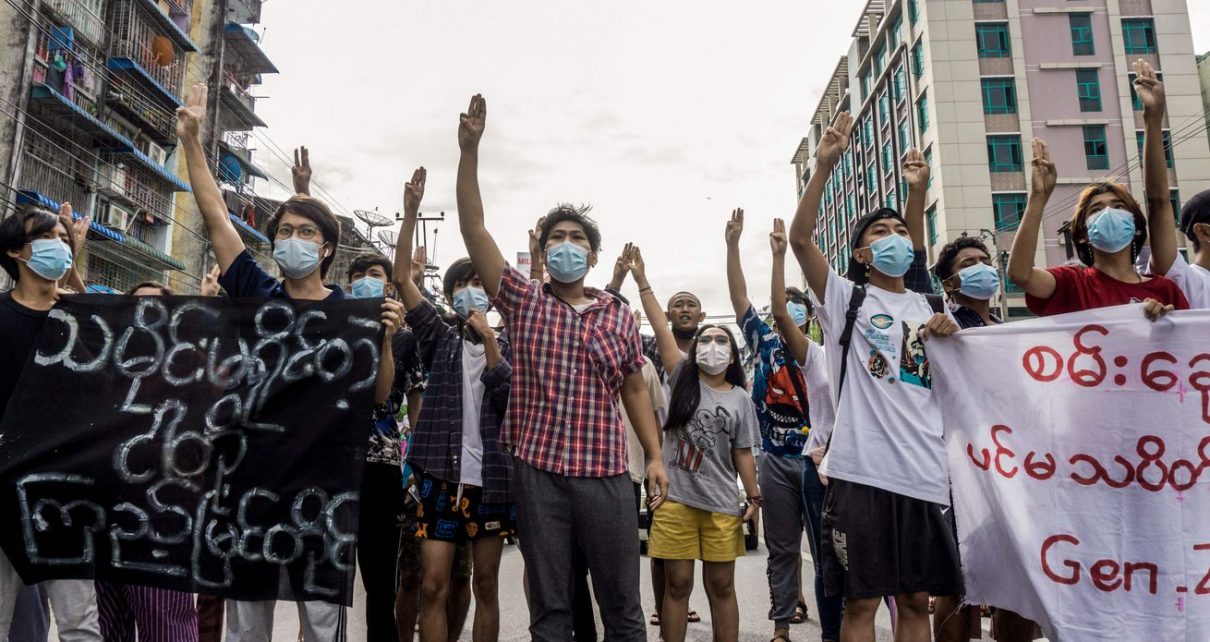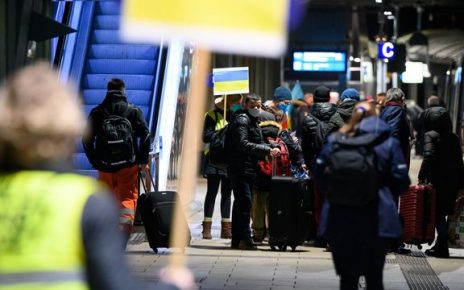
“We cannot live in a world where military coups become a norm,” the UN Secretary-General said.
More than four months after the military seized power in Myanmar, the United Nations General Assembly took the rare step on Friday of voting to formally condemn the February 1 coup and called for an end to arms dealing with the country.
The condemnation comes as UN officials express concern that the nation is on the brink of civil war and as humanitarian conditions worsen for civilians. While significant, though, the vote itself revealed complicated geopolitics that may stymie a more forceful international response to the situation.
The UN approved the resolution by a vote of 119 to 1, with 36 countries abstaining. In addition to condemning the junta and calling for the return of a democratic government in Myanmar, the resolution also urges “all [UN] Member States to prevent the flow of arms into Myanmar.”
“The risk of a large-scale civil war is real,” Christine Schraner Burgener, the UN special envoy on Myanmar, said after the vote. “Time is of the essence. The opportunity to reverse the military takeover is narrowing.”
The resolution was lauded by members of the international community, including deputy head of the European Union delegation Ambassador Silvio Gonzato, who greeted it as “a rare and significant expression of the General Assembly condemnation in the face of a gross violation of fundamental democratic norms and neglecting the clearly expressed wish of a people.”
“The international community does not accept the coup, and it does not recognize any legitimacy to the regime that emerged from it,” Gonzato said Friday in a statement.
With the support of 119 countries, the UN General Assembly adopted a resolution that calls on Myanmar’s military junta to restore the democratic transition and calls on all member states “to prevent the flow of arms into Myanmar.” The international community has spoken. pic.twitter.com/DqCPAwPX3R
— U.S. Embassy Burma (@USEmbassyBurma) June 19, 2021
The UN has taken a similar step only three times since the end of the Cold War, according to UN International Crisis Group Director Richard Gowan, after military coups in Haiti, Burundi, and Honduras in 1991, 1993, and 2009, respectively. Such a unified response by the General Assembly was not deployed in response to other significant military power grabs in recent years, including multiple national crises in Thailand.
However, the resolution, which is nonbinding, is unlikely to make any immediate difference in the crisis currently plaguing Myanmar, and it stops short of imposing an outright arms embargo on the southeast Asian nation, which borders Thailand. And China and Russia — two of Myanmar’s largest suppliers of weapons — were among the countries that abstained from the vote.
On Sunday, Pope Francis called for humanitarian aid to be allowed into the country and for houses of worship to be offered as sanctuary to those fleeing violence. Hundreds of people have been killed since the February coup, and some 175,000 more have been displaced.
The vote revealed messy international politics
Initially, UN General Assembly President Volkan Bozkir had hoped to adopt Friday’s Myanmar resolution by consensus; in a speech prior to the vote, Bozkir told members of the assembly that “when it comes to Myanmar we must act, as nations, united. I trust that you, as Guardians of the Charter of the United Nations, will join me in this call for peace.”
But Belarus, eventually the sole no vote on the resolution, forced a recorded vote instead, resulting in a significant number of abstentions.
Sometimes known as “Europe’s last dictatorship,” Belarus has previously sold weapons to Myanmar, according to the activist group Justice for Myanmar, and the small eastern European nation has been the target of international scrutiny in its own right after dictator Alexander Lukashenko held onto power in a sham presidential election last year.
In addition to permanent UN Security Council members China and Russia, several members of the Association of Southeast Asian Nations, or ASEAN, abstained from voting on the resolution. Brunei, Cambodia, Thailand, and Laos — all of which are categorized as “not free” by the international watchdog organization Freedom House — chose to abstain.
The #UNGA resolution on #Myanmar calls
– for the “immediate release of all those detained arbitrarily”
– “for safe & unimpeded humanitarian access to all people in need”
– on “all member states to prevent the flow of arms into Myanmar”
FULL TEXT➡️ https://t.co/GYC9f51Iqc— Nadira Kourt (@NadiraKourt) June 18, 2021
Unsurprisingly, Myanmar’s military government has already rejected the resolution and accused the UN of infringing on Myanmar’s sovereignty. Despite that, however, the resolution was supported by Myanmar in the UN, where Myanmar ambassador to the UN Kyaw Moe Tun, who was appointed under the previous democratic government, has refused to leave his post.
“We need further strongest possible action from the international community to immediately end the military coup, to stop oppressing the innocent people, to return the state power to the people, and to restore the democracy,” Kyaw Moe Tun said in February.
Whoa. It is impossible to overstate the risks that #Myanmar UN ambassador Kyaw Moe Tun just took in the @UN General Assembly when (voice cracking) he just now called on world to oppose the military coup. See photo below of him giving the three-fingered salute of the protestors. https://t.co/qnmr0RMY0S
— Samantha Power (@SamanthaJPower) February 26, 2021
While Friday’s resolution is noteworthy, multiple UN officials — including Schraner Burgener and Special Rapporteur on human rights in Myanmar Tom Andrews — have called for the UN to do more as Myanmar’s humanitarian crisis worsens.
“[T]he [United Nations Security Council] should now take action by imposing an arms embargo, sanctions & measures to hold the junta accountable,” Andrews wrote in a tweet on Saturday.
Yesterday’s UNGA resolution on Myanmar was notable because of how strongly it rebuked the junta, AND because not a single UNSC member voted against it. This means that the UNSC should now take action by imposing an arms embargo, sanctions & measures to hold the junta accountable.
— UN Special Rapporteur Tom Andrews (@RapporteurUn) June 19, 2021
However, that could prove difficult. As permanent Security Council members, China and Russia both have veto power over Security Council proposals, and both have remained friendly with Myanmar since the coup earlier this year.
Chinese companies are among the largest suppliers of weaponry to the Myanmar military, according to a report by Justice for Myanmar, a pro-democracy advocacy group, and Russia has also sold fighter jets and other matériel to Myanmar.
Previously, the Security Council condemned the use of violence against peaceful protesters in Myanmar and backed a democratic transition away from military rule in a March statement, but it’s unclear if more concrete actions against the Myanmar junta, such as an arms embargo, would escape a veto.
A humanitarian crisis
Myanmar’s democratic collapse has also engendered additional humanitarian crises, including a faltering health system and endangered food supplies, Schraner Burgener said on Friday, according to the UN news agency.
Currently, according to the UN, more than 600 people have been killed since the junta took power in February — the regime has repeatedly used live ammunition on peaceful protesters — and thousands have been arrested. Around 175,000 people have been displaced, and more have fled to neighboring countries as refugees. On Sunday, Pope Francis called for military leaders to allow aid to reach those displaced people.
Some reports, however, put the death toll since February at 800 or more — and the true number is likely even worse.
In April, Human Rights Watch also reported that hundreds of people have been forcibly “disappeared” by the junta since February — a crime against humanity under international law.
How did Myanmar get here?
Myanmar — sometimes known as Burma — has been in crisis since well before Friday’s UN resolution. In early February, the country’s military, which has long been a force in domestic politics, seized power after losing elections in November last year — citing, without evidence, voter fraud as the reason for their loss.
The coup, which ousted popular leader and Nobel Peace Prize winner Aung San Suu Kyi, was a return to an earlier era for Myanmar, which had been under military rule for decades until 2011. And it set off a massive, enduring pro-democracy movement, with protests continuing this month despite a brutal crackdown and the use of live ammunition by regime forces.
/cdn.vox-cdn.com/uploads/chorus_asset/file/22670175/1231185623.jpg) Aung Kyaw Htet/SOPA Images/LightRocket via Getty Images
Aung Kyaw Htet/SOPA Images/LightRocket via Getty ImagesAs Vox’s Alex Ward explained at the time, the coup was telegraphed well ahead of time by the country’s military, which refused to accept the results of Myanmar’s November 2020 parliamentary elections.
Suu Kyi’s National League for Democracy (NLD) party won overwhelmingly in November, claiming fully 83 percent of the available seats in parliament.
Suu Kyi is a beloved national figure in Myanmar, and spent the better part of two decades under house arrest for her pro-democracy activism after the NLD won parliamentary elections in 1990. She was only released in 2010, shortly before Myanmar’s democratic transition.
However, she has become increasingly controversial in the eyes of the international community for her role in Myanmar’s genocide against the Rohingya, a Muslim ethnic minority. Thousands of Rohingya people were killed, and more than 700,000 rounded up and deported, by the same military that is now in power.
As Vox’s Jariel Arvin reported earlier this year, Suu Kyi “not only refused to condemn the military for its actions, but went as far as to defend them in an international court.” That decision has complicated international support for Myanmar’s pro-democracy movement, which still venerates Suu Kyi.
In 2020, history repeated itself for Suu Kyi after her NLD party claimed a “landslide” November election victory. According to Ward:
… the military and its political arm immediately claimed the elections were fraudulent, though foreign observers and the nation’s electoral commission declared there had been no significant problems. They went so far as to demand a new, military-supervised election, filed 200 complaints to local election agencies, and took their case to the nation’s Supreme Court.
Then … a military spokesperson warned that the armed forces might “take action” if their assertions of fraud weren’t taken seriously and notably refused to rule out a coup. Citing a provision in the constitution it drafted, the military said it could launch a coup if the nation’s sovereignty was threatened and declare a national emergency.
“Unless this problem is resolved, it will obstruct the path to democracy and it must therefore be resolved according to the law,” a military spokesperson said.
Finally, just before Myanmar’s parliament was set to certify the results of the election, the military, led by Senior Gen. Min Aung Hlaing, seized power. They detained Suu Kyi and other government officials, as well as many activists, halted flights in and out of the country, and declared a state of emergency that would last one year.
Since then, hundreds of thousands of pro-democracy protesters have continued to push back on the junta, though with little success so far, and often facing deadly violence. Suu Kyi is once more under house arrest by the junta on charges of sedition.
In addition to cracking down on civil society and arresting prominent activists and political opponents, the regime has blocked access to social media sites like Facebook, Twitter, Instagram, and WhatsApp, and in April began shutting down broadband access outright.
And military forces continue to unleash arbitrary violence against protesters, reportedly even launching mortar shells into civilian neighborhoods. As Vox’s Jen Kirby reported in May, “At 8 pm, when people [in Yangon, Myanmar] still bang pots and pans in protest, security forces will sometimes fire at the sounds — with slingshots, stones, bullets.”
In the face of such large-scale human rights violations, Friday’s UN resolution does little to clarify what comes next for Myanmar.
Show trials and a kangaroo court
On Monday, after months of house arrest, Suu Kyi appeared in court to stand trial for a long list of spurious charges, including corruption, inciting public unrest, and violating Myanmar’s official secrets act.
All told, according to the Washington Post, Suu Kyi faces seven charges and up to 15 years in prison — which could well amount to a life sentence for the leader, who marked her 76th birthday in confinement on Saturday.
/cdn.vox-cdn.com/uploads/chorus_asset/file/22670265/1231058962.jpg) SAI AUNG MAIN/AFP via Getty Images
SAI AUNG MAIN/AFP via Getty ImagesThe trial and charges alike are considered by regional experts to be a political exercise rather than a judicial one, and the outcome is all but preordained with Myanmar still under military rule.
“With the restrictions on access to her lawyers and the case being heard in front of a court that is wholly beholden to the military junta, there is little likelihood she will receive a fair trial,” Human Rights Watch deputy Asia director Phil Robertson said, according to the Washington Post.
The trial starting next week vs legitimate #Myanmar leader Aung San Suu Kyi will be a total joke. #Tatmadaw junta’s charges are politically motivated & bogus & will be heard by kangaroo court fully controlled by the military #WhatsHappeningInMyanmar #Burma https://t.co/ql5ZWUzN7j pic.twitter.com/qDKF4KrRVL
— Phil Robertson (@Reaproy) June 9, 2021
Suu Kyi isn’t the only political prisoner facing a show trial in Myanmar: The junta is also holding deposed president Win Myint on a range of politicized charges, and protesters are being arrested, tortured, and sentenced to prison en masse.
According to Myanmar Now, a local news outlet, 32 protesters were sentenced to prison terms of at least two years earlier this month on charges of incitement and unlawful assembly. And an American, Danny Fenster, is among dozens of journalists facing charges of inciting fear or spreading “false news;” Fenster was detained three weeks ago en route to visit family in the US.
Despite the junta’s best efforts, however, there is still a vibrant opposition movement in Myanmar — one that has welded together a broad, but potentially fragile, alliance of ethnic groups against a common enemy.
As Kirby explained for Vox, the pro-democracy protests have been “part awakening, part atonement” for some protesters, particularly in regard to the military’s campaign of genocide against the Rohingya:
[Activist Wai Hnin Pwint Thon]’s experience is an extreme example of the kind of revelation that has happened among many young protesters, especially among the majority Bamar ethnic group. “Some of us were brainwashed,” Wathone, the protester in Yangon, said. “But now everyone understands what the Rohingya feel, what the ethnic groups feel.”
Now, with armed ethnic factions supporting members of the Civil Disobedience Movement, the conflict in Myanmar could soon enter a new phase. Some protesters Kirby spoke to admitted that “nonviolence is maybe not working. So we need some armed resistance.”
Already, according to Reuters, the junta is fighting on “multiple fronts in border regions” against local insurgents, and some young pro-democracy protesters are leaving Myanmar’s urban centers to join the anti-regime guerrillas.
“The brutality of the Burma military is even worse,” civil society activist Naw Wah Ku Shee told Kirby of the newfound cohesion among ethnic groups. “Our first priority is to end this military dictatorship, which is why we need to work together.”





